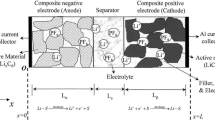Abstract
At present, the propulsion system of majority of vehicles on the road still depends upon the combustion of fuels to extract the energy. Combustion is a high-temperature exothermic reaction in which oxygen reacts with the fuel and produces gaseous bi product. The expansion of high-temperature, high-pressure gas inside the engine produces useful work to propel the automobile. Once useful mechanical work is done, harmful gases such as COx and NOx are released into the atmosphere. The major concern bothering the governments globally is climate change and greenhouse effect primarily caused by the emissions of CO2. As a result, the transportation sector is constantly looking for alternative sources of energy to replace the fossil fuel-based engines. At this point of time, Electric Vehicles (EV)/Hybrid EV (HEV) becomes the life savior, since they mainly run or conversion of electrical energy into mechanical energy. The power source of the EV is the energy stored as chemical energy in Li-ion battery due to their inherent advantages such as lighter in weight, smaller in size, and low maintenance. Speaking about the Li-ion battery, battery management system (BMS) is an internal part of the battery pack. Therefore, this paper mainly focuses on the development of Simulink models of various battery technology and compare against each other. Also, to estimate the SOC as accurately as possible to balance the cells more efficiently, thereby storing significant amount of energy in the battery pack. This paper initially reviews the different battery packs for the Electric Vehicles (EV)/Hybrid EV (HEV), and later, a battery management system is proposed where the state-of-charge (SoC) is estimated accurately for different battery packs.













Similar content being viewed by others
References
UNEP. Towards a green economy: pathways to sustainable development and poverty eradication – transport. United Nations Environment Programme. 2011. http://www.unep.org/greeneconomy/Portals/88/documents/ger/10.0_Transport.pdf. Accessed 26 Jan 2014.
EEA. Monitoring CO2 emissions from new passenger cars in the EU: summary of data for 2011. European Environment Agency, Denmark. 2012. http://www.eea.europa.eu/publications/monitoring-co2-emissions-from-new. Accessed 29 Oct 2013.
European Commission. 2014. http://ec.europa.eu/clima/policies/transport/vehicles/cars/index_en.htm. Accessed 10 April 2014.
Lelie M, et al. Battery management system hardware concepts: an overview. Appl Sci. 2018. https://doi.org/10.3390/app8040534.
Arbizzani C, et al. List of contributors. In: Scrosati B, Garche J, Tillmetz W, editors., et al., Advances in battery technologies for electric vehicles. Woodhead Publishing; 2015. p. xi–xiii.
Gao Y, Ehsani M. Investigation of battery technologies for the army’s hybrid vehicle application. In: Proc. IEEE 56th Veh. Technol. Conf., vol. 3. 2002; pp. 1505–1509.
Crompton TR. Battery reference book. Boston : Butterworth-Heinemann, Oxford [England], 1995. Available: http://books.google.com/books?id=7e1SAAAAMAAJ.
Chan CC, Chau KT. Modern electric vehicle technology. Oxford University Press; 2001.
Pattipati B, Pattipati K, Christopherson JP, Namburu SM, Prokhorov DV, Qiao L. Automotive battery management systems. IEEE Autotestcon. 2008;2008:581–6. https://doi.org/10.1109/AUTEST.2008.4662684.
**ng Y, Ma EWM, Tsui KL, Pecht M. Battery management systems in electric and hybrid vehicles. Energies. 2011;4(11):1840–57. https://doi.org/10.3390/en4111840.
Cheng KWE, Divakar BP, Wu H, Ding K, Ho HF. Battery-management system (BMS) and SOC development for electrical vehicles. IEEE Trans Veh Technol. 2011;60(1):76–88. https://doi.org/10.1109/TVT.2010.2089647.
Chiasserini CF, Rao RR. Energy efficient battery management. In: Proceedings IEEE INFOCOM 2000. Conference on Computer Communications. Nineteenth Annual Joint Conference of the IEEE Computer and Communications Societies (Cat. No.00CH37064), vol. 2. 2000; pp. 396–403. https://doi.org/10.1109/INFCOM.2000.832212.
Affanni A, Bellini A, Franceschini G, Guglielmi P, Tassoni C. Battery choice and management for new-generation electric vehicles. IEEE Trans Ind Electron. 2005;52(5):1343–9. https://doi.org/10.1109/TIE.2005.855664.
Stuart T, Fang F, Wang X, Ashtiani C, Pesaran A. A modular battery management system for HEVs. 2002; https://doi.org/10.4271/2002-01-1918.
Kaiser R. Optimized battery-management system to improve storage lifetime in renewable energy systems. J Power Sources. 2007;168(1):58–65. https://doi.org/10.1016/j.jpowsour.2006.12.024.
Author information
Authors and Affiliations
Corresponding author
Ethics declarations
Conflict of interest
The authors declare that they have no conflict of interest.
Additional information
Publisher's Note
Springer Nature remains neutral with regard to jurisdictional claims in published maps and institutional affiliations.
This article is part of the topical collection “Data Science and Communication” guest edited by Kamesh Namudri, Naveen Chilamkurti, Sushma S J and S. Padmashree.
Rights and permissions
About this article
Cite this article
Nitesh, K.A., Ravichandra A Study on Battery Controller Design for the Estimation of State of Charge (SoC) in Battery Management System for Electric Vehicle (EV)/Hybrid EV (HEV). SN COMPUT. SCI. 2, 197 (2021). https://doi.org/10.1007/s42979-021-00600-0
Received:
Accepted:
Published:
DOI: https://doi.org/10.1007/s42979-021-00600-0




